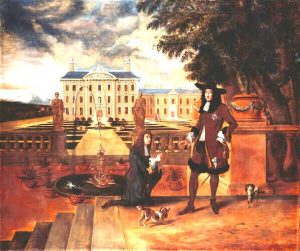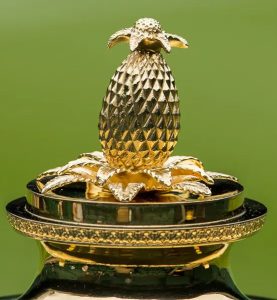Jnanendra Das writes on the history and significance of pineapples through the ages and its symbolic elevation in the markets for Meghalaya’s pride.
 A 17th-century painting by the artist Hendrick Danckerts depicts the royal gardener presenting Charles II, the King of Great Britain and Ireland, with what would become known as the king of fruits. The painting, commissioned by the king himself and attributed to his court painter, was once believed to commemorate the first pineapple grown in England. This fruit, sometimes considered a berry, was first introduced to Europe by Christopher Columbus after his voyage to Guadeloupe in the 15th century. With its crown-like top and exotic taste, it became a status symbol among the European upper class. The Fibonacci sequence pattern of the pineapple also inspired architectural motifs in parts of Europe, including the western towers of St Paul’s Cathedral in London, England. It even adorns the Wimbledon Gentlemen’s Singles Trophy, and the list goes on.
A 17th-century painting by the artist Hendrick Danckerts depicts the royal gardener presenting Charles II, the King of Great Britain and Ireland, with what would become known as the king of fruits. The painting, commissioned by the king himself and attributed to his court painter, was once believed to commemorate the first pineapple grown in England. This fruit, sometimes considered a berry, was first introduced to Europe by Christopher Columbus after his voyage to Guadeloupe in the 15th century. With its crown-like top and exotic taste, it became a status symbol among the European upper class. The Fibonacci sequence pattern of the pineapple also inspired architectural motifs in parts of Europe, including the western towers of St Paul’s Cathedral in London, England. It even adorns the Wimbledon Gentlemen’s Singles Trophy, and the list goes on.
 If you haven’t guessed it by now, we are, of course, talking about pineapples. They are considered symbols of peace, prosperity, and hospitality, and for Meghalaya, they represent the pride of growing one of the sweetest ‘kew’ varieties. Over 6.5 tonnes of pineapples were sold at the recently concluded Meghalaya Pineapple Festival in Dilli Haat, attracting thousands of visitors. Held from 10 to 14 July, this was the second edition of the festival in the National Capital, Delhi. In the previous edition in 2023, over 10,000 pineapples were sold during the three-day event. This year, the quantity exported from the state increased to 9-10 tonnes. Additionally, this particular variety is also made available at Safal Mother Dairy outlets in Delhi. The fruit is sent to Safal Dairy every week as an attempt to promote the produce and connect the local farmers to markets both within India and abroad.
If you haven’t guessed it by now, we are, of course, talking about pineapples. They are considered symbols of peace, prosperity, and hospitality, and for Meghalaya, they represent the pride of growing one of the sweetest ‘kew’ varieties. Over 6.5 tonnes of pineapples were sold at the recently concluded Meghalaya Pineapple Festival in Dilli Haat, attracting thousands of visitors. Held from 10 to 14 July, this was the second edition of the festival in the National Capital, Delhi. In the previous edition in 2023, over 10,000 pineapples were sold during the three-day event. This year, the quantity exported from the state increased to 9-10 tonnes. Additionally, this particular variety is also made available at Safal Mother Dairy outlets in Delhi. The fruit is sent to Safal Dairy every week as an attempt to promote the produce and connect the local farmers to markets both within India and abroad.
Meghalaya is the fifth-largest pineapple-producing state in the country, after West Bengal, Assam, Karnataka, and Tripura. Pineapple cultivation originated in Brazil and gradually spread to other tropical parts of the world. Christopher Columbus introduced pineapples to Europe in the 15th century after his voyage to Guadeloupe, a French overseas region in the southern Caribbean Sea. Pineapple cultivation was introduced to India by the Portuguese in 1548 AD (Source: National Horticulture Board, 2021-22).
It is no exaggeration to say that Europeans went wild for this exotic delicacy! A British colonist, Richard Ligon, who had a sugarcane plantation in Barbados, wrote at the time that the pineapple was ‘far beyond the choicest fruits of Europe’ (Source: Terry MacEwen, Historic UK). Unfortunately, Europe’s climate didn’t favour the cultivation of pineapples, so the only option was to import them from the “New World”, a historical term referring to the American continents and other landmasses in the Western Hemisphere.
With its crown-like top, pineapples would be the centrepiece at dinner parties, not eaten but viewed, almost revered. Some would even rent a pineapple for an evening and carry it around like an accessory! Having a pineapple was a huge status symbol. They were incorporated into sculpture, civic architecture, and design in private houses, courts, and statues. The nobility almost kept the “king pine,” selling it at an exorbitant price.
Another thing the English elite gate kept was the game of tennis. They believed tennis was a game only for the nobility, so when the Wimbledon Trophy was introduced for the Gentlemen’s Singles in 1887, it had a golden pineapple motif on top. The most plausible explanation for this unlikely fruit atop the most prestigious trophy in tennis is that, when The Championships began in the latter half of the 19th century, pineapples were prized as a rare and exclusive food (Source: Wimbledon News).
Pineapples grown mostly in Northeast and Peninsular India are unique and prized not just in the rest of the country, but worldwide. Pineapples are exported from India to countries such as the UAE, Qatar, the Maldives, the USA, Belgium, Iran, Bahrain, and Oman. Their uniqueness comes from their longer maturation period; it takes almost two years for a pineapple to grow and reach its ripened stage. Evolutionary science is full of surprises. Sitting for so long on the ground without any mobility, the fruit develops a strong defence mechanism. Animals can’t consume it from the top due to its sword-like leaves, which have sharp, upcurved spines on the edges. The rough and spiky shell that covers the fruit also makes it hard for wildlife to bite, and even if they manage to, the sharp microscopic needles of calcium oxalate called “raphides” in the fruit will cause micro-cuts in an animal’s mouth. Another layer of protection comes from “bromelain” in the fruit, which is biologically called a flesh-eating enzyme that can break down protein. This is where the saying “every time you eat a pineapple, it eats a little bit of you” comes from.
Fortunately for humans, our digestive enzymes can overpower the pineapple’s defences. Bromelain helps reduce inflammation from tendonitis, sprains and strains, and other minor muscle injuries. Vitamin C provides antioxidant support. Nutritionally, the fruit provides plenty of nutrients, is low in calories, and is high in vitamins and minerals. Many even consider pineapples to be a natural aphrodisiac. No wonder there is a rising demand for Meghalaya’s Kew pineapples both in national and international markets, boosted by their organic and zero-pesticide cultivation methods.
(With inputs from C.K Nayak’s Sweet and Sour Pineapple Fest, Dilli Haat 2023, The Shillong Times, August 27, 2023)
Photo captions
Image 1: The iconic painting ‘Charles II presented with a pineapple’ (c 1677) shows Charles II being presented with a pineapple by his gardener John Rose.
Image 2: (Dunmore Pineapple built as a summer house in 1761 by the Earl of Dunmore. Stirlingshire, Scotland)



